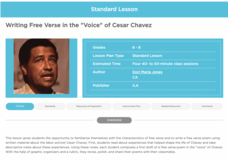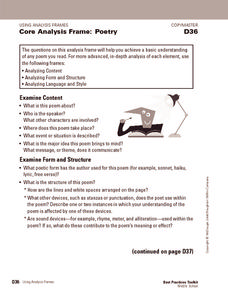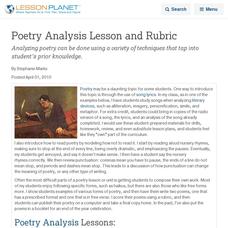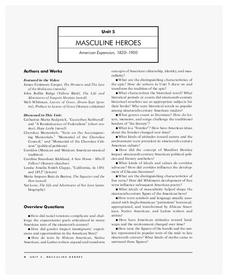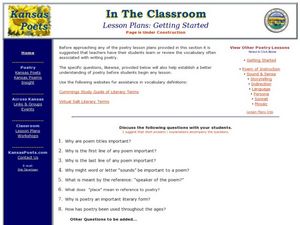ReadWriteThink
Writing Free Verse in the "Voice" of Cesar Chavez
Introduce middle schoolers to free verse poetry with a lesson that has young poets read two free verse poems and list the common characteristics of the form. They then read a passage from Cesar Chavez's biography and a free verse poem...
Core Knowledge Foundation
Sixth Grade Poetry
Study some of the most prominent poets and works of poetry in history with a language arts poetry unit. From Virgil to Shakespeare to Dickinson to Angelou, the resources present biographies and examples of poetic elements to the sixth...
Anti-Defamation League
Social Justice Poetry
Learners gain insight into how songs and poems express feelings of injustice. They also learn about literary devices and types of poems and make a personal connection when they write their own free verse poems about injustice.
Annenberg Foundation
Rhythms in Poetry
Rhyme, rhythm, free verse, imagery: Do these words describe poetry, or jazz music? The answer is both! A resource explores these similarities as scholars watch a video, engage in discussion, read author biographies, write poetry and...
Academy of American Poets
Teach This Poem: “As I Walk These Broad Majestic Days” by Walt Whitman
Walt Whitman's poem "As I Walk These Broad Majestic Days" offers scholars an opportunity to practice their noticing skills. They first examine a postcard of the Newport News Shipyard listing things they notice about the image and how...
Curated OER
On World Poetry Day, We're All Poets
Put away the books and the printouts, and break out the paper and pens to honor World Poetry Day.
Curated OER
Poetry Notes
Break this presentation into two or three days so as not to overwhelm your kids. Fifty-four slides is a lot of slides, but the PowerShow is well-organized, and terms are defined clearly and illustrated in examples provided. A general...
Houghton Mifflin Harcourt
Core Analysis Frame: Poetry
Dig deep into any piece of poetry with a set of analysis questions. Ponder the content, form, and language of poetry and provide some question for critique. The first two pages include general questions, and the remainder of the document...
Curated OER
Out of the Dust: Background notes about the novel, The Great Depression, and The Dust Bowl
If your class is reading the historical fiction novel, Out of the Dust, then you are in luck. Here are a few slides that will help you provide historical context for the book, as well as define main characters, setting, symbolism, and...
Curated OER
Poetry Analysis Lesson and Rubric
Analyzing poetry can be done using a variety of techniques that tap into student's prior knowledge.
Curated OER
Teaching Selected Poems from Jim Wayne Miller's the Brier Poems
Students explore the basic elements of poetry through Appalachian life poetry. In this poetry lesson, students read seven poems from Jim Wayne Miller's the Brier Poems and complete poetry analysis activities for each poem.
Annenberg Foundation
Masculine Heroes
What were the driving forces behind American expansion in the nineteenth century, and what were its effects? Scholars watch a video, read biographies, engage in discussion, write journals and poetry, draw, and create a multimedia...
E Reading Worksheets
Tone Worksheet 5
A speaker's attitude toward his or her subject matter determines the tone of a piece of literature. Interpret the tone of four different poems, as well as their meanings, with supporting textual details.
Curated OER
Ballad
Young balladeers analyze examples of ballads and generate a list of common traits (story, quatrains, rhyme schemes, refrains, etc.), then identify these traits in Robert W. Service's "The Cremation of Sam McGee" and a ballad written by...
Curated OER
Poetry: Getting Started
Students define literary terms and answer short answer questions about poetry. In this poetry starter lesson, students discuss the importance of titles, first and last lines, sounds, and speaker. Students define a set of literary terms...
Crafting Freedom
Frances Ellen Watkins Harper: Lover of Literacy
This, the sixth in a series of 10 related resources, examines the life and works of Frances Ellen Watkins Harper, an African American author, born in 1825, who advocated literacy for both free and enslaved African Americans.
Curated OER
Out of the Dust
Students create a poem that expresses the physical and emotional turmoil of living through the Dust Bowl. In this Out of the Dust lesson, students research facts about the time period and discuss the cause-effect patterns associated...
Penguin Books
The Curriculum Guide for The Secret Hum of a Daisy by Tracy Holczer
The death of a parent can turn a child's world upside down. A curriculum guide for The Secret Hum of a Daisy explores defining moments in the main character's life, including the loss of her mother. Chapter-by-chapter discussion...
Ohio Department of Education
A Glossary of Literary Terms
If you're tired of defining allusion, onomatopoeia, and satire for your language arts students, hand out a complete list of literary devices to keep the terms straight. Each term includes a definition that is easy to understand and...
Curated OER
Come On, Rain!
Students read and analyze the story. In this language arts instructional activity, students read Come on, Rain! and examine how mood and tone are created, the use of figurative language and the characteristics of the genre. Students...
Other popular searches
- Free Verse Poems Animals
- Free Verse Poems Template
- Free Verse Poems Newspaper
- Writing Free Verse Poems
- Poems Free Verse


